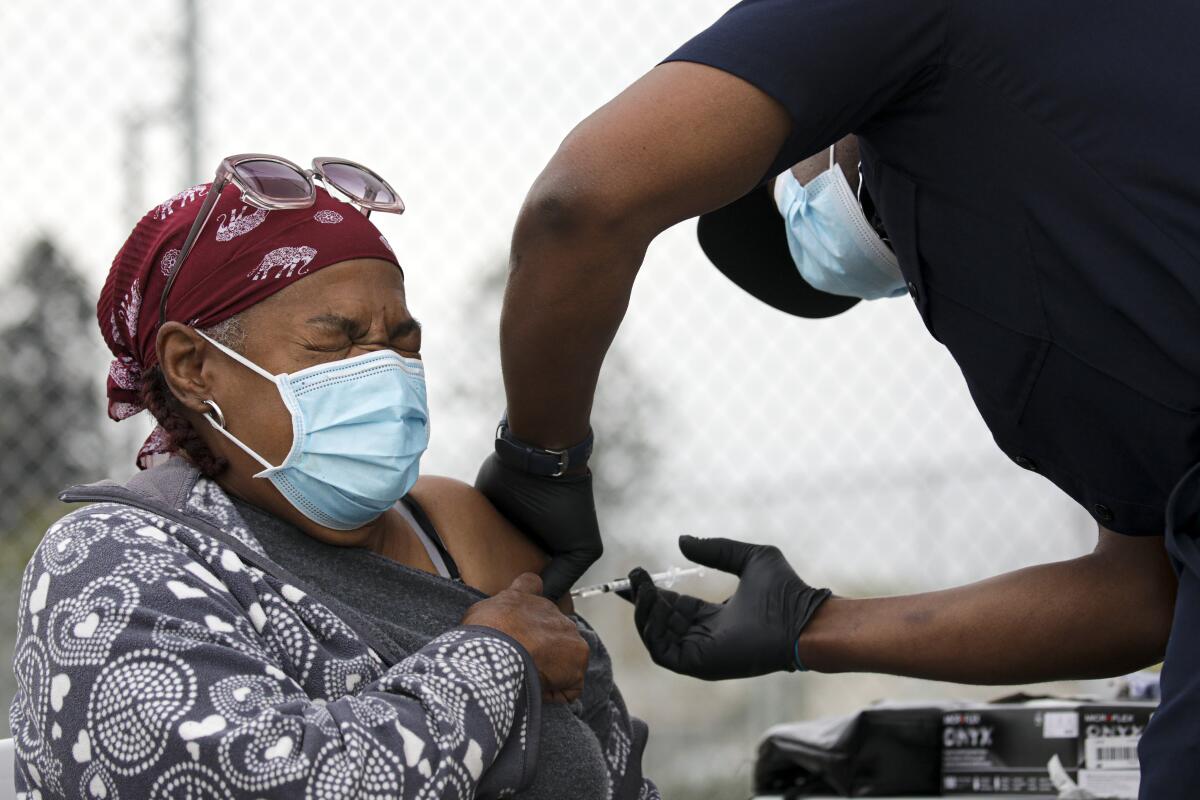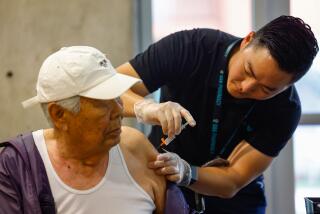Why are side effects worse after a second dose of COVID-19 vaccine?

- Share via
When it comes to the one-two punch delivered by two-dose COVID-19 vaccines, it’s the second shot that really wallops.
Kristen Choi can attest to that. Choi, a nursing researcher at UCLA, ended up with a host of symptoms, including a fever that peaked at 104.9 degrees, after she got her second shot last year. But the effects soon passed — and they were well worth the much-needed protection against the pandemic, she said.
“I’m very grateful to have gotten the vaccine and to be able to have that protection, and really want to see that opportunity be made available to everyone,” Choi said.
As more Americans line up for the COVID-19 vaccine, some are anxious about the second-dose side effects, which tend to be stronger than the first. But experts say that the symptoms, which range from a sore arm to headaches and nausea, are a sign that the second dose is doing its job: turbo-charging the immune system’s response to the initial dose, and thus providing more vigorous and long-lasting protection against the virus.
Two of the three vaccines that are authorized for use in the U.S. — one made by Pfizer and BioNTech, the other by Moderna — require two doses, spaced three and four weeks apart, respectively. (Johnson & Johnson’s vaccine is a one-shot deal.)
There’s no special secret sauce to that second dose: Both the first and second shots are exactly the same. The first simply primes the immune system so that it’s ready to launch a more robust response when it’s time to roll up a sleeve once again.
“It’s just an amplification, basically, of the same process that happens the first time around,” said Dr. Diane Griffin, an infectious diseases expert at the Johns Hopkins Bloomberg School of Public Health.
Common side effects include pain, redness and swelling on the arm that receives the shot, according to the Centers for Disease Control and Prevention. Typical side effects elsewhere in the body include tiredness, headache, muscle pain, chills, fever and nausea.
As more Americans line up for COVID-19 vaccines, children have been excluded. But that is expected to change by the fall, Dr. Anthony Fauci says.
And if you don’t experience side effects, that’s “totally fine,” said Dr. Grace Lee, a pediatric infectious diseases expert at Stanford Children’s Health. Your body is still doing its job.
“The good thing is not everybody gets a reaction,” Lee said.
The Pfizer and Moderna vaccines work by giving the body’s cells a blueprint to make a replica of the virus’ spike protein. Before an immune cell responds to the offending replica by destroying it, the defender develops a memory of the protein so that it can attack again in the future.
“The fever, headache, etc., that you experience is because of the inflammatory proteins doing their work in the body to get rid of what it believes to be an outsider,” Dr. Jasmine Marcelin, an infectious diseases expert at the University of Nebraska Medical Center, explained in an email.
Choi experienced this firsthand. She volunteered for a clinical trial testing the Pfizer-BioNTech vaccine and got her first shot in August. There were virtually no side effects — just a sore arm.
But after Choi’s second dose, her arm quickly became far more painful at the injection site. By the end of the day, she was suffering from chills, nausea and a splitting headache. Around midnight, she woke up with an arm so painful she could barely lift it. At 5:30 a.m., she logged a scarily high fever.
She took Tylenol and drank water. Her fever hovered around 99.5 degrees for the rest of the day. By the next morning, her symptoms had vanished (except for a sore, swollen bump at the injection point).
Choi described her experiences in an essay published in December in JAMA Internal Medicine. Since then, she said she’s received emails from hundreds of people, many of whom said they came across her account and said it was comforting to know these reactions were common, and OK. (Choi learned after publication that she had indeed received the vaccine and not a placebo.)
To be clear, it’s rare to have symptoms as intense as the ones Choi experienced: Only 4 out of a subset of 8,183 participants in the larger clinical study experienced fevers above 104 degrees (and two of them were in the placebo group), according to data published in the New England Journal of Medicine and posted on the CDC website.
In fact, besides arm pain, the most common side effects after the second dose were fatigue and headache.
After 90 days, the immunity developed in response to a coronavirus infection is about as protective as a COVID-19 vaccine, according to a new study.
While there have been a few instances of severe allergic reactions with both the Pfizer-BioNTech and Moderna vaccines, they are exceedingly rare. Just to be safe, the CDC advises people to be monitored for 15 to 30 minutes after receiving their shot so they can get immediate treatment if necessary. Anyone experiencing symptoms such as throat swelling, itchiness, hives or trouble breathing after leaving the vaccination site should seek emergency medical care immediately, experts said.
Those who have an “immediate allergic reaction” to a first dose of either the Moderna vaccine or the Pfizer-BioNTech vaccine should not receive a second dose, the CDC says. But for everyone else, the experts agree: Get the second shot.
Compared with suffering through an actual bout with COVID-19 — not to mention the possibility of contending with long-term complications from the disease — there’s really no contest, said Lee, the pediatric infectious diseases expert.
“Vaccines are a far safer way to develop immunity,” she said.
And if you’ve never been infected with this coronavirus, you need that second dose of vaccine to ensure your immune system’s response is strong, and will last over time, experts said.
Choi noted that people ages 55 and younger appeared to suffer more from side effects than the senior crowd. There’s a reason for that, she said: “If you are younger, your body has a stronger immune system and a little bit more capacity to mount that immune response.”
So as more vaccine becomes available and younger people step up for their shots, it’s important to let them know what to expect, and that side effects are a completely normal part of the process.
“It’s a signal that the vaccine is working,” she said.







